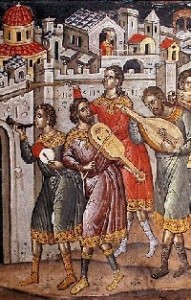 Reader Spencer asks what Byzantine music sounded like and if there is any way to hear it today.
Reader Spencer asks what Byzantine music sounded like and if there is any way to hear it today.
Not too much is known about Byzantine secular music although given their fascination with the classical past, it was probably similar to that of ancient Greece and Rome. (Support for this theory is that the earliest Byzantine hymns still have the metrical schemes of ancient Greek poetry.) Music in the Hellenistic world had an important part in nearly every occasion and that continued in the Byzantine east. Singers- usually accompanied by stringed instruments and dancers- were found in most processions, celebrations, and even funerals. Stringed instruments were the most popular, although reed, wind, and percussion were also used. A 9th century Persian traveler who visited Constantinople reported that he was serenaded by dancers playing several types of harps and lyres. The water organ in particular attracted his attention- and apparently that of citizens generations before him. It shows up in several carvings, most prominently the base of Theodosius’ 4th century obelisk in the Hippodrome.
When it comes to sacred music, we’re on firmer ground. The first religious musicians originated in monastic communities around the time of Justinian, but unfortunately a musical writing system to record notes didn’t come to Constantinople till the 8th or 9th century. (We don’t know exactly what the early stuff sounded like, but most likely it was a plainsong or simple chant- to read a much more in-depth discussion of this go here: http://bit.ly/bKp3Tj)
Now for the good news. Byzantine music is surprisingly easy to find. Many of the notable figures of Byzantine history composed hymns or added to the liturgy- from St. John Chrysostom to Justinian and Leo the Wise- and they are still sung or chanted to this day. The best way to hear them is to attend your local Orthodox church, especially during one of the important liturgical days. If that’s not your cup of tea, then head on over to iTunes and do a search for ‘Cappella Romana’. They are a vocal group ‘specializing in Slavic and Byzantine repertories’.
Either way- by church or ipod- Byzantium will come alive as you’ve never experienced it before.
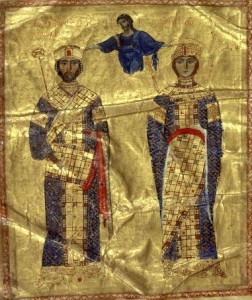 Reader Evan asked who was the last person from the original Roman patrician families to play a significant role in Byzantine history.
Reader Evan asked who was the last person from the original Roman patrician families to play a significant role in Byzantine history.
The last mention I can find is the Emperor Nicephorus III (1078-1081) who claimed to be descended from the ancient Fabii. This may have been wishful thinking on his part, but it does hint at the intriguing possibility that genealogical records survived the Byzantine ‘dark’ ages. The main problem with finding a descendant of the early families is that so many records were destroyed in the chaos of the 7th – 9th centuries, and many traditions were not maintained. And of course many patrician families had fallen on hard times even by Julius Caesar’s day (the Julii for example were impoverished) and the rank of Patrician became a mere political plaything during the empire. By the time of Augustus’ death (14 AD) only 15 families were left, and a century later that number had dropped to just 6. Constantine supplied new blood by opening the rolls to anyone in the imperial court (he was trying to lure as many patricians as possible to Constantinople to increase its prestige, and when that failed he just created new ones). Justinian further diluted it by making everyone of Senatorial rank a patrician. This was an easy (inexpensive) way of rewarding followers and it started an imperial trend of granting the rank in greater and greater numbers. By the 11th century it had been so extensively handed out that it meant little, and by the 12th century it disappeared completely.
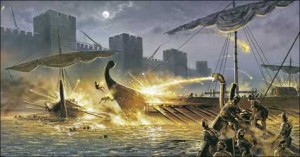 Reader Jeroen asked what happened to the once mighty Byzantine navy that forced them to become so reliant on Genoese or Venetian sea power?
Reader Jeroen asked what happened to the once mighty Byzantine navy that forced them to become so reliant on Genoese or Venetian sea power?
The Byzantine navy was in a way a victim of its own success- coupled with a complete lack of vision. By the end of the Macedonian dynasty, it was the preeminent force in the eastern Mediterranean. Major seaborne invasions were carried out against targets as far away as Sicily, and Sardinia, and the traditional naval powers of the Caliphate and the Russians were a receding threat. The last serious Arab attack had come in 1035 and the last Russian one a decade later, and they both had been beaten back with ease. There seemed no reason to pay for a huge navy with no one to fight, so Constantine IX (1042-55) had the fleet broken up into smaller units. These detachments spent most of their time chasing after pirates, and quickly faded from the imperial attention. Neglect and incompetence did the rest and by the end of the 11th century the fleet was in a deplorable position. Other navies sprang up to fill the vacuum and the aging, ill-equipped Byzantines were routinely defeated by Turkish, Italian, and even Norman ships. This humiliating state forced Alexius Comnenus (1081-1118) to sign an agreement with Venice exchanging trade concessions for naval support. To his credit he recognized the danger and did his best to build up the imperial navy with the meager resources available. By the time of his death he handed over a small but serviceable fleet to his successors, which was still strong enough to fend off the Venetians two decades later (at the steep cost of one of Enrico Dandolo’s eyes).
Alexius’ son and grandson, however, discovered that fleets are very expensive, and since they were more interested in land campaigns they transferred most of the funding to the army. The next dynasty (Angelus 1185-1204) was a good deal worse, dropping even the pretense of upkeep. They depended on trade concessions with Sicily, Venice, and Genoa to keep their coasts secure, and concentrated on having a good time. One particularly pathetic emperor (Alexius III Angelus) even allowed one of his generals to sell off the warships for personal profit, virtually abolishing the navy. By the time of the 4th Crusade there were only 20 ships left, 3 of which were seaworthy. The other 17 were loaded down with Greek Fire and pushed in the direction of the Crusader’s navy. Basil II must have been spinning in his grave.
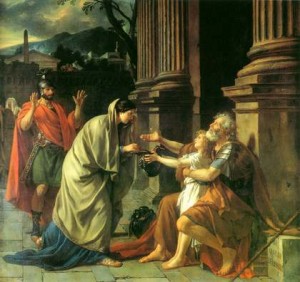
Reader Bryan asked what I thought of the legend that Belisarius was blinded by Justinian. According to the story, a jealous and fearful Justinian arrested Belisarius after his final victory and had him tried for treason. The loyal general’s eyes were put out, his estates confiscated, and he was forced to wander the streets of Constantinople begging for bread while contemplating the vicissitudes of fortune.
Belisarius did briefly fall out of favor late in Justinian’s reign, but was publicly rehabilitated. The story of his blinding originated in the 12th century with the monk John Tzetzes who was trying to criticize the political figures of his own day. It made for a good morality tale, and was pressed into service in the 18th century by Europeans (mostly French) who saw a parallel between the tyranny of Justinian and their own autocratic societies. (see the spectacular painting by Jacques-Louis David and the play ‘Bélisaire’ by Jean-François Marmontel)
Some scholars still argue that the legend does have some basis in fact (Justinian was certainly capable of it), but there are several reasons not to accept it. The Crusaders who sacked Constantinople in 1204 mentioned several large statues of Belisarius still standing. Had he been blinded and disgraced these surely would have been torn down. Along the same lines there was also a great cycle of mosaics detailing the victories of Justinian and Belisarius above the gate to the imperial palace. These were made during Justinian’s lifetime and were still in place a thousand years later. Finally, there are the writings of the contemporary historian Procopius. In his ‘Secret History’ he makes no mention of the emperor humiliating his general, despite the fact that he clearly hated Justinian and was trying to blacken his name. He accuses Justinian of being a devil in the shape of a man, of being responsible for the deaths of a trillion people, and of having a head that would routinely disappear- but not of harming Belisarius.
Nevertheless the legend persists- perhaps because its lesson still resonates. As Henry Wadsworth Longfellow summed it up neatly in his poem about the great general:
“Ah! Vainest of all things
Is the gratitude of kings.”
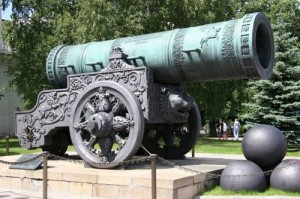 Reader Patricia asks if the Byzantine defeat in 1453 can really be blamed on ‘modern weapons’ since the Byzantines also had access to them. Was it really a matter of simply not having enough money to build them?
Reader Patricia asks if the Byzantine defeat in 1453 can really be blamed on ‘modern weapons’ since the Byzantines also had access to them. Was it really a matter of simply not having enough money to build them?
I think the Ottomans would have eventually been able to take the city in any case. It was far too exposed, depopulated, completely cut off from friendly Christian powers, and vastly outnumbered. But for all that, it still took 48 days of continuous bombardment. Given the tensions within the Ottoman army and the loss of face associated with each unsuccessful day, would Mehmed have been able to maintain discipline and morale if he had to wait on traditional siege machines? There were already serious challenges to his authority brewing by the time he broke in- and that was with the aid of ‘super’ weapons that could punch their way through walls. Constantine XI was fully capable of rallying his troops and did quite well with his limited forces. It’s always dangerous to speculate but I think he could have held the city against one or two standard Ottoman attempts.
So firepower was clearly important, but as Patricia correctly pointed out, it wasn’t just a simple matter of technology. The Byzantines actually did have a few guns- though they were smaller than the Ottoman’s and frequently damaged their own walls with the recoil. What they really lacked was the infrastructure needed to sustain the technology. Enough money couldn’t be scraped up to retain Urban much less pay for the powder, projectiles, and the specialists needed to fire and repair them. The Ottomans could afford to fully integrate massive new cannons into their army; for the impoverished Byzantines- even if Urban had built his great gun for free- they had to remain a curiosity.

Reader Karen asked why the emperors seemed so fond of mutilation. Believe it or not this was actually seen as a more humane practice of dealing with potential usurpers than the standard treatment of execution. By longstanding tradition only someone of unblemished physical appearance was fit to rule, so a little mutilation (usually blinding, cutting off the nose or splitting the tongue) was an easy way to remove a threat without killing anyone. This held true till the reign of the monstrous Justinian II who was deposed in 695 and sent into exile without his nose. The resourceful man had a gold replacement made and managed to storm Constantinople, taking terrible vengeance on the usurpers. He was given the nickname “Rinotmetos” (the Slit-nosed) and since mutilation obviously hadn’t kept him from the throne, it thankfully fell out of favor. The practice wasn’t completely abandoned, however. Deposed rulers were still occasionally blinded and some emperors- Basil the Bulgar-Slayer comes to mind- mutilated on a mass scale as a way of intimidating their enemies.
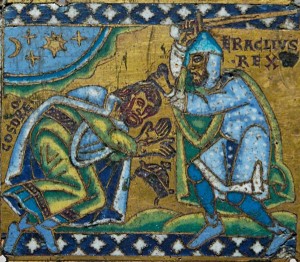 Reader Kevin asked this question and it’s one that I get a lot. The Islamic contribution to scientific learning is an important one and is widely taught in schools. They played a vital role both in the advancement of science and in its transmission to the West, specifically through Spain. What is frequently overlooked, however, is the Byzantine underpinnings of that achievement. Unlike the West where the pagan aspects of the classical past made it taboo, the East viewed it as inseparable from Christian society. The fourth century Church father Basil of Caesarea summed up the Byzantine position neatly in a pamphlet he wrote called ‘To Young Men, On How They Might Derive Profit from Pagan Literature’. The classical world, in other words, was a treasure trove to be mined- though with extreme caution. This is not to say that the Byzantines continued the Greek spirit of inquiry full bore, merely that they preserved the Greek legacy more or less intact. After the initial shock of Islamic conquest, when it became apparent that the empire wasn’t going to be swept away, relations with the rising Caliphate became more stable, allowing a cultural exchange. The Arabic world absorbed Greek learning and improved on it, pushing the frontiers of medicine and science during the brilliant High Caliphate. Those advances in learning fully belong to Arab genius, but they couldn’t have been accomplished without the preserved texts or tutors and scholars to translate them. These were all ultimately provided by Byzantium.
Reader Kevin asked this question and it’s one that I get a lot. The Islamic contribution to scientific learning is an important one and is widely taught in schools. They played a vital role both in the advancement of science and in its transmission to the West, specifically through Spain. What is frequently overlooked, however, is the Byzantine underpinnings of that achievement. Unlike the West where the pagan aspects of the classical past made it taboo, the East viewed it as inseparable from Christian society. The fourth century Church father Basil of Caesarea summed up the Byzantine position neatly in a pamphlet he wrote called ‘To Young Men, On How They Might Derive Profit from Pagan Literature’. The classical world, in other words, was a treasure trove to be mined- though with extreme caution. This is not to say that the Byzantines continued the Greek spirit of inquiry full bore, merely that they preserved the Greek legacy more or less intact. After the initial shock of Islamic conquest, when it became apparent that the empire wasn’t going to be swept away, relations with the rising Caliphate became more stable, allowing a cultural exchange. The Arabic world absorbed Greek learning and improved on it, pushing the frontiers of medicine and science during the brilliant High Caliphate. Those advances in learning fully belong to Arab genius, but they couldn’t have been accomplished without the preserved texts or tutors and scholars to translate them. These were all ultimately provided by Byzantium.
The empire played a similar catalyst role in the Renaissance. Byzantine émigrés traveled to the West and re-introduced the study of Greek classics, tutoring luminaries like Petrarch and Boccaccio in the process. Cosimo Medici was even so impressed by a lecture on Plato from a Byzantine scholar named Pletho, that he restarted the Academy in Florence. Obviously both the Renaissance and the Arab Enlightenment pushed the frontiers of knowledge in ways that were independent of Byzantium, but neither would have been possible without Byzantine pens.
 Reader Spencer asks what Byzantine music sounded like and if there is any way to hear it today.
Reader Spencer asks what Byzantine music sounded like and if there is any way to hear it today.




